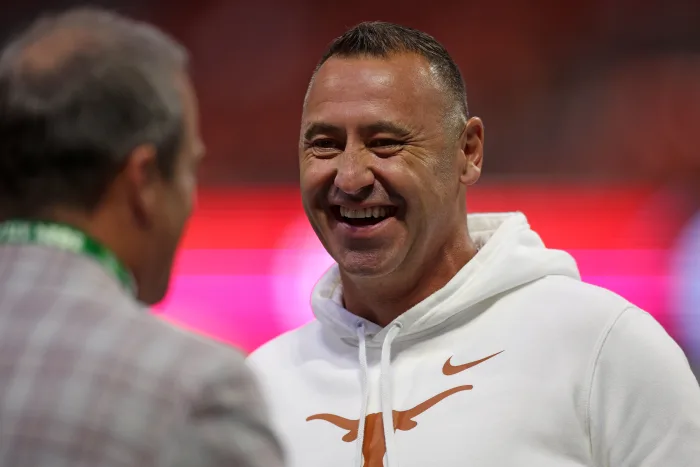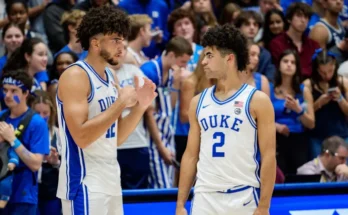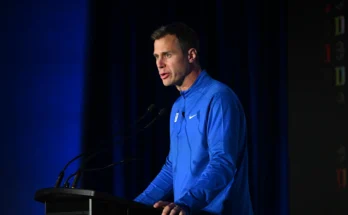Steve Sarkisian’s Risky 50-50 Bet on a Five-Star Recruit Pays Off as Texas Football Gets a Definite Answer
In the high-stakes world of college football recruiting, few decisions carry as much weight as the recruitment of a five-star athlete. These players are the ones that can reshape a program, alter its trajectory, and elevate it from mediocrity to championship contender. For Steve Sarkisian, head coach of the University of Texas Longhorns, one such decision came with a bold gamble that would ultimately define the immediate future of his program. His 50-50 bet on a five-star recruit was a risk, one that could have backfired, but instead, it has given Texas a clear answer in their pursuit of greatness.
Sarkisian’s tenure at Texas had already been under a microscope since he took the reins in 2021. The Longhorns, a program rich in history and tradition, had fallen into a cycle of underperformance. Despite a storied past that included national championships, legendary players, and a fervent fan base, Texas had struggled to return to its glory days. Sarkisian was brought in to reverse that trend, to bring in a new offensive scheme, and most importantly, to recruit at the highest level.
Recruiting, particularly for top-tier talent, is an art form. Coaches have to evaluate prospects not only on their current ability but also their potential for development. They must also navigate the personal side of recruitment, forming relationships with players and their families while outmaneuvering rivals who are also vying for the same talent. The stakes are high, and the margin for error is razor-thin. In this context, Sarkisian’s decision to pursue one specific five-star recruit would serve as a critical juncture in his career at Texas.
The recruit in question was Arch Manning, a quarterback from the famed Manning family. Arch was a consensus five-star prospect and considered by many to be the best quarterback in his class. With his pedigree—his uncles Peyton and Eli Manning are two of the most accomplished quarterbacks in NFL history—and his skills on the field, Arch was the type of player that could immediately change a program’s fortunes. His recruitment was the subject of national attention, and programs from across the country, including Alabama, Georgia, and Texas, made strong pushes to land him.
From the moment Sarkisian became involved in Manning’s recruitment, it was clear that Texas was going to have to offer something special to land the young quarterback. The Longhorns were in competition with some of the most established programs in the country, each offering its own unique appeal. Alabama, under Nick Saban, was a powerhouse with a track record of success. Georgia, fresh off a national championship, was a rising dynasty. Texas, on the other hand, had the allure of a storied program, a passionate fan base, and the chance to be the quarterback who could lead the team back to prominence.
Sarkisian’s approach to Manning’s recruitment was one of building relationships, both with the recruit and with his family. Understanding the weight of the Manning name, Sarkisian knew that it wasn’t just about offering Arch a chance to play at Texas—it was about understanding his background and ensuring that the fit between the player and the program was right. Sarkisian’s offensive system, which emphasizes quarterback development, quick decision-making, and a pro-style approach, was an ideal match for Manning’s skill set.
The recruitment process was an intense one, with both sides weighing their options and making decisions that would impact the future. Sarkisian had to navigate through the uncertainty of whether Manning would choose Texas or one of its rivals. On the one hand, he had a strong pitch, offering the chance for Manning to be the face of a resurgent Texas program. On the other hand, the Longhorns had yet to prove they were capable of competing for national titles, something other programs could offer more immediately.
Manning’s decision would not only affect the Longhorns but also shape the landscape of college football. A commitment from Arch would send shockwaves through the sport, signaling that Texas was back and that it could once again compete with the best. For Sarkisian, landing Manning would be a major statement, a sign that his vision for Texas was coming to fruition. But the decision wasn’t an easy one, and Sarkisian knew that the risk of putting all his eggs in one basket could end in disappointment if Manning chose elsewhere.
In the end, Manning’s decision came down to a mix of factors, and Steve Sarkisian’s gamble paid off. Arch Manning committed to Texas, signaling the beginning of a new era for the Longhorns. The news reverberated throughout college football, and it was clear that Sarkisian’s 50-50 bet had been the right one. Manning’s commitment to Texas provided the Longhorns with a definitive answer: they were once again relevant in the national conversation.
For Sarkisian, this was not just a victory in recruiting; it was a victory in vision and execution. By landing Manning, Sarkisian solidified his place as a coach who could not only develop talent but also attract it. The Longhorns were no longer a program of potential; they were a program with a future. The arrival of Manning would bring a sense of legitimacy to Texas, and it would have ripple effects throughout the roster. Players and recruits alike would look at the Longhorns differently, seeing them as a program on the rise, capable of competing for championships.
However, the journey for Texas and Sarkisian doesn’t end with Manning’s commitment. The quarterback is still a young prospect, and while his potential is undeniable, it will take time to develop him into the player he is capable of becoming. Texas will need to surround Manning with the right pieces, build an offensive line that can protect him, and provide him with skill players who can help him succeed. Sarkisian will also need to continue recruiting at a high level, bringing in the talent necessary to challenge the top programs in the country.
The gamble on Manning also came with a significant amount of pressure. There are no guarantees in college football recruiting, and even a player as highly touted as Manning could face obstacles. Injuries, personal growth, and the rigors of college football can all derail a promising career. If Manning doesn’t live up to expectations, the pressure on Sarkisian and the Texas program will only intensify. But for now, with Manning in the fold, the Longhorns have the quarterback they need to challenge for championships.
As Texas enters the new era with Arch Manning at the helm, the future looks bright. The Longhorns now have a foundation to build upon, and with Steve Sarkisian leading the charge, the program is poised to rise to new heights. Manning’s commitment has given Texas the definitive answer it needed—a sign that the program is back in the conversation among the college football elite. It’s a bold bet that has paid off, and one that could reshape the future of Texas football for years to come.



